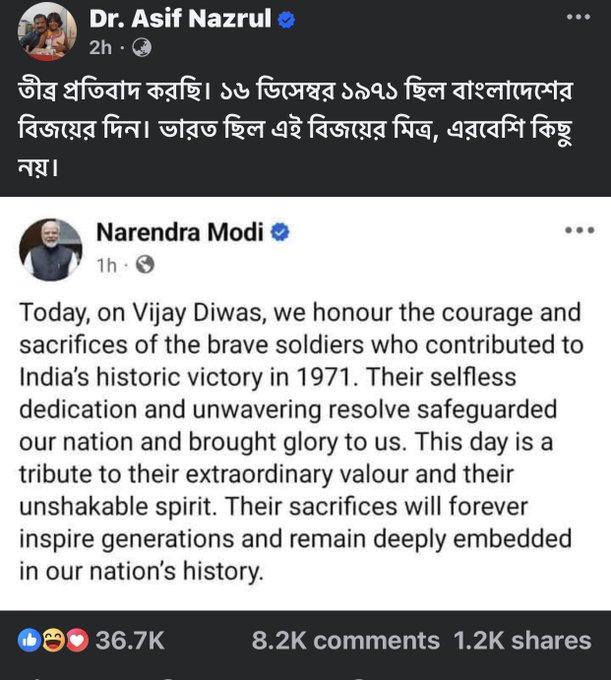From Liberation to Betrayal: Bangladesh’s Shocking Transformation
On December 16, 1971, the Indian Army, alongside Bengali freedom fighters, shattered Pakistan’s tyrannical grip over East Pakistan. This victory marked the birth of Bangladesh—a nation freed from the Islamist cruelty of Operation Searchlight, which saw over three million Bengalis murdered and countless women assaulted. However, 53 years later, Bangladesh’s political narrative has taken a tragic and ironic turn.
Erasing India’s Role in the 1971 Bangladesh Liberation
The Yunus-led interim government has intensified efforts to diminish India’s indispensable role in Bangladesh’s liberation.
The recent backlash against Prime Minister Narendra Modi’s Vijay Diwas message reflects this disturbing trend. Modi’s message honored India’s soldiers for their courage during the 1971 war.
On this special day of Vijay Diwas, I had the honour of paying my respects at the National War Memorial and merging into the Eternal Flame, the four Vijay Mashaals which traversed across the length and breadth of the country over the course of last one year. pic.twitter.com/HwTKXEcaoq
— Narendra Modi (@narendramodi) December 16, 2021
However, Bangladeshi leaders, including law advisor Asif Nazrul and BNP’s Ishraque Hossain, dismissed India’s role, calling India “just an ally” and nothing more.
Hasnat Abdullah, a vocal leader, escalated tensions by labeling Modi’s message a “direct threat” to Bangladesh’s sovereignty. He urged Bangladeshis to “continue their struggle against India,” blatantly ignoring the historical reality of Pakistan’s genocide and India’s military intervention that liberated Bangladesh.
The Rise of Islamist Politics
Despite its liberation from Pakistan’s brutal rule, Bangladesh never fully eradicated Islamist extremism. The Pakistan-supporting Jamaat-e-Islami (JeI) and the Bangladesh Nationalist Party (BNP) have embedded themselves into Bangladesh’s political structure.
Following Sheikh Hasina’s undemocratic ouster in August 2024, the interim government, led by Muhammad Yunus, lifted the ban on Jamaat. This move emboldened Islamist outfits like JeI, which now dominate national politics and incite violence against minorities, particularly Hindus, Buddhists, and Christians.
Shockingly, Jamaat-e-Islami members, once collaborators in the 1971 genocide, are being portrayed as heroes in Bangladesh’s official posters. Their resurgence aligns with growing hostility towards India—the very nation that secured Bangladesh’s independence.
Romanticising Pakistan, Vilifying India
While India remains Bangladesh’s largest trading partner and steadfast ally, the Yunus administration has strained ties by halting visa services in Tripura. Meanwhile, Dhaka now facilitates visas for Pakistani citizens. This puzzling alignment with Pakistan—the architect of Bangladesh’s darkest genocide—underscores the influence of pan-Islamist ideology.
The narrative peddled by BNP and JeI mirrors Pakistan’s own strategy: fostering hatred against India to gain domestic control. An average Bangladeshi Islamist parrots grievances like border disputes and water-sharing issues. Yet, the deeper cause lies in the pervasive ideology that sees Hindu-majority India as an adversary and Islamic Pakistan as a ‘natural’ ally.
Minorities Bear the Brunt
Hindus, who once shared deep cultural ties with Bengali Muslims, are now targeted under archaic laws and violent campaigns. Lands are confiscated arbitrarily, and temples are desecrated. This reflects a broader pattern of religious persecution, reminiscent of the atrocities committed by Pakistan’s military in 1971.
The irony is bitter: a nation founded on resisting Islamist oppression now mirrors the very ideology it once fought to defeat.
Bangladesh: Grim Future
As Islamist outfits grow in power, Bangladesh risks becoming a tragic replica of East Pakistan. Its leadership’s appeasement of Pakistan and disdain for India signal a dangerous shift. Islamist mobs are erasing Mujibur Rahman’s legacy, replacing the iconic “Joy Bangla” slogan with narratives steeped in extremism.
For India, Bangladesh’s betrayal serves as a cautionary tale. It highlights how Islamist supremacy can overshadow humanitarian alliances and erase the sacrifices of an entire liberation struggle.
The Yunus administration’s attempts to erase India’s role in 1971 further cemented the nation’s descent into ideological extremism. By rewriting history, Bangladesh risks abandoning its foundational legacy of freedom and dignity.



